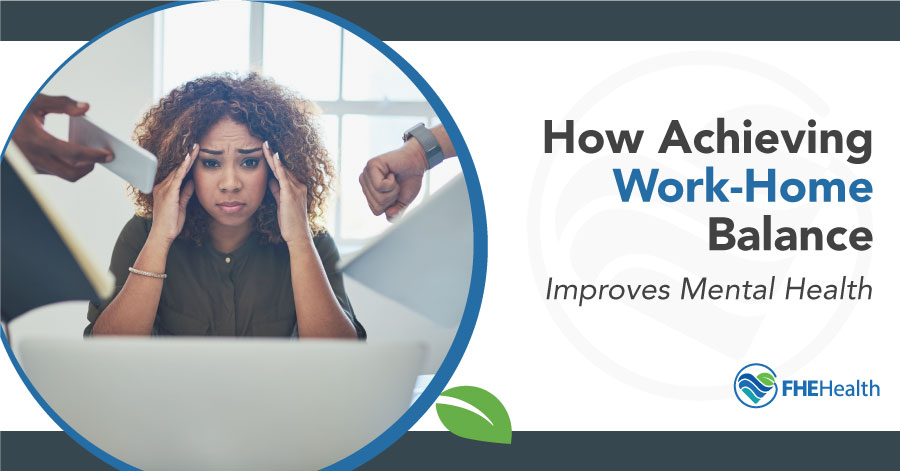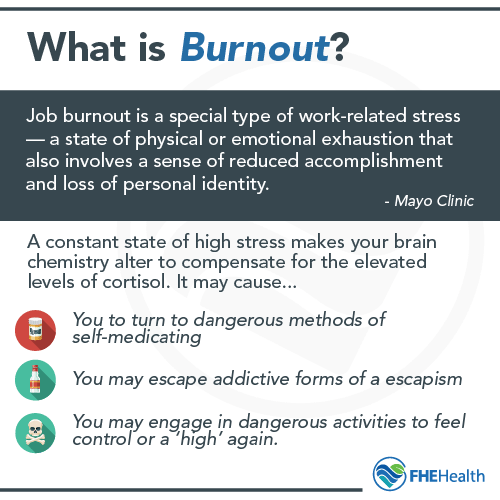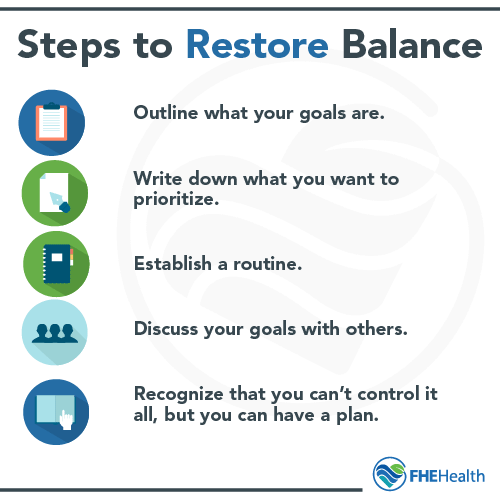
Updated January 1st, 2022
Is it possible to balance work and family commitments? You’ve spent yet another day working late, missed your planned family dinner and may not be able to pick up your son from football practice.
You’re tired, and the last thing you wanted to see was more talk from your so-put-together-friend on social media about enjoying drinks with friends. Your day off is already committed to household tasks and perhaps five straight hours of sleep if you’re lucky. You’re stressed and ready to check out from everything.
It’s a common situation. Earning more, advancing a career and even building your own business are all factors that contribute to a culture of work-more. Work dominates our lives, and that in itself can lead to a high-stress level.
The Bureau of Labor Statistics’ 2018 American Time Use Survey found that 24% of employees who worked, on average, 8.5 hours a day did some of their work at home. Since 2009, the amount of time people spent performing work tasks has grown by 24%.
What Exactly Is the Balance of Work and Family?
The term “balance” can be misunderstood. Not everyone wants their home and work life to be equal components. For some, there’s a desire to spend most of their time and energy building their family and private life.
For others, career achievements are very important. There’s nothing wrong with either choice. What’s important is defining the right level of each that makes you happy.
If you made a list of everything you could do during a day, without any restrictions, what would be at the top of your list? What would you discard? Prioritizing your life based on your true desires and personal happiness is more valuable than trying to balance hours in the day for any one or two tasks.
Burnout: When Too Much Work Happens

Even with this open definition of balance, it’s still important to realize that burnout is a very real thing. When you’re under too much pressure, your brain releases too much of the stress hormone, cortisol. Over time, this alters your brain’s chemistry, changing the way you think, focus and live.
A constantly high cortisol level is dangerous. Your body can’t maintain this for a long time. Eventually, you may find yourself turning to other ways to cope with the stress.
- You may turn to drugs that stimulate your brain to work harder.
- You may reach out to alcohol to help you stop thinking about everything else for a few minutes.
- You may engage in dangerous behavior just to get a high from life again.
When you reach a level of unbalanced, high-stress daily living, you put yourself at risk of a breakdown. People with mental health problems, even those that are undiagnosed, are at a high risk of experiencing emotional and mental failure. This can lead to episodes of dangerous depression and anxiety.
How to Assess Your Work and Home Balance
 When work or other tasks cut into your family and friend time, you can become mentally stressed. This is a clear sign that it’s time for you to reach out for some help. How do you know you’re at that point?
When work or other tasks cut into your family and friend time, you can become mentally stressed. This is a clear sign that it’s time for you to reach out for some help. How do you know you’re at that point?
Start with a mental health day. Take a day off work to relax and do things you enjoy doing. Does this offer you enough relief? If you’re dreading heading back to work, consider further assessment.
- Write down the things you haven’t done in the last few weeks that you wish you had.
- Ask yourself honestly when was the last time you weren’t overwhelmed by work.
- Be honest about whether you think you will ever catch up on your work so you can enjoy a better schedule.
- Do you find yourself awake at night thinking about work?
- Assess your quality of life today. Is it what you want it to be?
Many people who are already busy won’t take the time to work through an assessment like this. You can see how that’s a sign in itself of a problem.
Signs You Need to Find Better Balance
When is it time to change things? Whether you need to adjust your hours or simply just say “no” more often, there are several warning signs you shouldn’t ignore.
- Your stress level is so high so often that it’s creating physical health problems for you.
- Your work quality has slipped due to stress factors.
- You hate your job or the people you work with and state that often.
- You’ve suffered an anxiety attack or a bout of depression over your current situation.
- You’re missing key components of your family life, and you want this to change.
Don’t wait until you have a physical ailment to take time off work. It’s important for you to work toward improving your situation right now.
Steps to Take to Restore Balance
 Stay on top of your work-life balance by constantly working on it. This isn’t a simple change for many people. Start here:
Stay on top of your work-life balance by constantly working on it. This isn’t a simple change for many people. Start here:
- Outline what your goals are. How much time do you want to spend at home and at work?
- Write down actual tasks you want to have more time for each day and week.
- Establish a routine that builds in time to help you achieve those goals.
- Discuss your goals and reasons with your family. Ensure they’re supportive.
- Recognize that no day is perfect, but each day, you can work to improve work-life balance.
1. Set Realistic Expectations
One of the most important things you can do when you’re trying to balance your work and home life is accept that it’s not possible to do it perfectly. If you have a picture in your head of how you’ll work exact hours without any distractions or interruptions at home and seamlessly integrate into relax mode once you clock out, this could be an unachievable ideal. Instead, put your effort into setting yourself up the best you can with the understanding that it’ll likely never be perfect.
2. Find Something You’re Passionate About
If all you’re doing after work is bingeing TV or scrolling aimlessly on your phone, it’s going to be harder to feel like you’re recovered and refreshed when the alarm clock goes off tomorrow morning. Finding a hobby or activity you truly enjoy and are passionate about can help you have something to look forward to and maximize that mental recovery time.
3. Prioritize Health Over Work
We get it. You have bills to pay, and those bills require money. And money requires working. But if work is your only priority at the expense of everything else, it’s likely your health is going to suffer. And eventually, it may deteriorate to the point where you’re forced to slow down and take some time off. Putting your health first doesn’t mean you have to slack on the job, but it does mean you have to be intentional about what you can and can’t commit to and what falls within your job description.
4. Make Time for Yourself
The old adage is true: You have to help yourself before you can be in a position to help anyone else. Making time for yourself isn’t selfish or a waste of hours — even though today’s rush culture may make it seem that way. It’s vital to your physical, mental and emotional well-being. Keep in mind that making time for yourself doesn’t have to mean taking off for a weekend trip once a month. It can be as simple as sitting quietly and really savoring your coffee before you start your day.
5. Make Time for Loved Ones
It’s also important to make time to connect with those around you and invest in your relationships with your loved ones. A sense of community is important for your overall mental health, and knowing you have a strong support team you can rely on when things get hectic at the office can help decrease your risk of burnout.
Achieve Better Work-Life Balance for Mental Health
Take steps to restore balance at work too. That may mean reducing your workload. Discuss your needed changes with your employer.
While doing so, be sure they understand how these changes can help you be a better employee. You’ll be able to focus better and be more productive.
Reach out for professional help. If your stress is more than what you think is warranted, it’s okay to turn to a mental health professional to get some tools to help you. When you work with our therapists at FHE Health, we can help you understand how to manage your time and your life better to ensure you’ll find a better balance.
Do You Need More Real Help?
Sometimes stress can create mental health risks. If you’re in that place right now, call FHE Health right away. Our team of compassionate counselors is available to help you right now to find an improved quality of life with mental health balance. Call (833) 596-3502.






